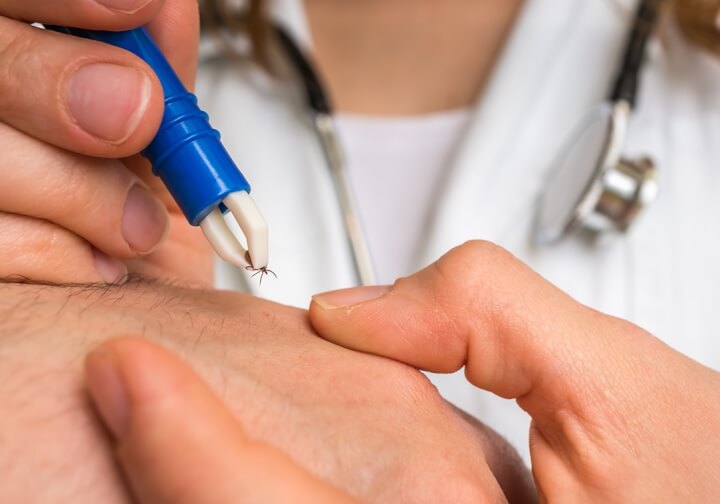
Found a tick on yourself? We'll give you advice on when to see a doctor
Encountering ticks is relatively common in our climate, especially in the spring and summer months. However, we are increasingly encountering ticks in our latitude even during mild autumns. Although in most cases no infection occurs, ticks can transmit serious diseases, especially Lyme disease and tick-borne encephalitis.
It is therefore important to know how these diseases can manifest themselves and when you should contact a doctor.
How to remove a tick correctly
Once you find a tick on yourself, you need to remove it as soon as possible. However, do not twist the tick during removal, as was formerly advised. Doing so could cause the tick's stomach contents to be expelled into the wound, allowing the bacteria that cause these diseases to enter the wound.
The correct way to remove a tick is to use tweezers or special tick removal forceps. Simply grasp the tick and pull it out of the wound slowly with a rocking motion perpendicular to the skin. Then disinfect the area where the tick was located. Do not apply any oils or ointments to the tick before removing it. Again, this could cause it to empty its contents into the wound.
The length of time the tick has been attached to you is crucial. The longer it is attached, the greater the risk of infection. Therefore, try to check yourself regularly when spending time in nature (forests, meadows, and city parks). This way, you can spot the tick while it is still crawling on you and has not yet attached itself.
When to contact a doctor after a tick bite
If you find a tick attached to you, there is no reason to panic immediately. In most cases, it is not necessary to see a doctor immediately after removing the tick. However, there are situations when a visit to the doctor is appropriate or even necessary for your health. Specifically, these are as follows:
-
A red spot larger than 5 cm appears at the site of the tick bite within the following days and continues to spread. This is a typical symptom of Lyme disease. In some cases, the spot may appear up to 4 weeks after the tick has been removed.
-
Within 1 to 4 weeks, fever, headache, joint pain, fatigue, or neck stiffness will appear.
-
The tick was attached for more than 24 hours (the risk of infection increases with the length of attachment).
-
You are not sure if the tick was removed completely (for example, if the head broke off).
-
In children, pregnant women, or people with weakened immune systems.
-
In cases of multiple tick bites or repeated bites within a short period of time.
Which tick-borne diseases can be treated
If Lyme disease is suspected, your doctor may recommend blood tests. If the infection is confirmed, antibiotics are administered. Follow-up treatment is usually very effective if started early. If left untreated, common symptoms of the disease include:
-
joint inflammation (often in the knees),
-
nervous system disorders (e.g., facial nerve paralysis),
-
meningitis,
-
heart problems.
It is also important to know that symptoms in children may be atypical or subtle, so it is better to be even more vigilant. If you suspect Lyme disease, do not hesitate to see your doctor as soon as possible.
Tick-borne encephalitis is a viral disease for which, unfortunately, there is no specific treatment. The only thing that helps is alleviating the symptoms. This is why vaccination is so important, as it is the only effective prevention.
The disease itself typically manifests itself in two stages.
-
The first stage occurs 7 to 14 days after the tick bite and is characterized by flu-like symptoms: fever, fatigue, headache, and muscle pain. The condition may then improve for a few days, which is why encephalitis is often only diagnosed in the second stage.
-
In some infected individuals, the second stage progresses to a more severe neurological form (inflammation of the brain and meninges, severe headaches, neck stiffness, vomiting, dizziness, impaired consciousness, paralysis).
The course of the disease is usually milder in children, but can be severe in adults, especially the elderly.
Vaccination against tick-borne encephalitis
Since there is no effective treatment for tick-borne encephalitis and vaccination is the only effective protection, it is recommended for everyone who spends time outdoors, even in cities, parks, or gardens.
The vaccine is widely available and is covered by health insurance for people over 50. Vaccination consists of three doses, followed by a booster shot every 3 to 5 years. You can get vaccinated at vaccination centers or at your family general practitioner.
Vaccination does not prevent ticks from biting, but it significantly reduces the risk of serious illness, which can lead to permanent neurological consequences.
Brief summary: when should you see a doctor after a tick bite?
See a doctor if:
-
suspicious skin changes appear at the bite site (especially a red circle),
-
you have a fever, muscle or joint pain, or fatigue,
-
the tick was attached for a long time or was not removed properly,
-
you are at higher risk (children, seniors, pregnant women),
-
or you want to find out about vaccination.
A tick bite is not automatically a reason to panic. However, it is a reason to be extra cautious. Vaccination is one of the surest steps you can take to protect yourself and your loved ones against at least one of the diseases that ticks can transmit.
Sources:
https://www.pozorkliste.cz/ockovani
https://www.vzp.cz/o-nas/aktuality/uhrada-ockovani-proti-klistove-encefalitide
https://www.ockovacicentrum.cz/cz/hrazene-ockovani-proti-klistove-encefalitide
